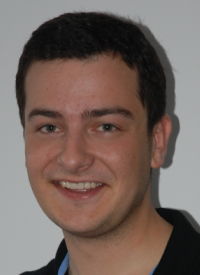Andrew Soulby
Andrew Soulby
Academic background
Before undertaking the MOAC MSc I completed a Masters degree in Neuroscience from the Universities of Nottingham and Melbourne. My aim when I first started MOAC was to pick up some of the skills I felt I had missed out on in my first degree, for example mathematical modelling and programming and then apply them to a PhD in Neuroscience. During the course, however, I found myself more interested in the tools I had hoped to use to carry out my future PhD than in my subject itself. Eventually I decided that I would rather do a PhD related to instrumentation and Physical Chemistry than in Neuroscience (although I still hope to return to that in some aspect during my PhD!).
About MOAC
From my own experiences I would reccomend the MOAC MSc to anyone who either wishes to learn new skills to apply to their current discipline or who wishes to change the direction of their research career. The first 6 months although intense give a great background in most areas of science, essentially teaching you a bit about each subject but more importantly teaching you quite how much you don't know about any of them! While the second 6 months of 3 research projects offer a brilliant opportunity to use as 'taster' sessions for your PhD, to try and find out what kind of research it is that you would like to spend the next 3 years doing. The most important aspect of MOAC though is the social one. Having only come to warwick at the beggining of my MSc year I'd anticipated it being difficult to meet people, especially given the workload! However, over the last year i've made a load of great friends both inside and outside of the course. In a strange way MOAC often functions like a surrogate family, with all the ups and downs that brings with it.

Mini Projects
Theoretical
During my first MOAC mini-project I worked with Dr. Magnus Richardson where I modelled the voltage characteristics of a simulated Pyramidal neurone with varying gamma distributed pre-synaptic inputs. This project gave me the opportunity to apply newly learned programming and mathematical modelling skills acquired over the course of the 6-month taught course to my Neuroscience background. Having never done any practical coding before this year I found the thought of writing my own program to carry out these simulations quite daunting! Once I started though and got to grips with the language I actually discovered how rewarding programming could be and really enjoyed my time doing it. The skills learned have also and I believe will continue to be totally relevant and helpful during my PhD and any research I do following that.
Biological
My Second mini-project was carried out at Gibbet Hill in the Dept of Life Sciences under the supervision of Dr. Lorenzo Frigerio. This project involved using confocal microscopy to study conformational changes to plant endoplasmic reticulum following Pseudomonas infiltration and the effects of reticulon protein over-expression on plant resistance in Arabidopsis.
Physical
My third mini-project was in the lab of Profs. Pat Unwin and Julie MacPherson. Here my project was centered around the design and fabrication of nanoscale electrodes for use in scanning electrochemical microscopy (SECM) and its derivatives. This involved the adaptation of existing instruments and construction of additional tools which resulted in a worked up method to produce electrodes ~1.5 orders of magnitude smaller than those currently being routinely used by the group allowing higher temporal and spatial resolution when imaging. Unlike the previous two projects in which the final goal was planned beforehand this was much more of an exploratory 'see how far you can go' project. The requirements to pull together various different aspects of science and the use of imagination required was something I really enjoyed and hope to replicate during my PhD.
My PhD
For my PhD I will be working jointly between the labs of Prof. Pete O'Connor and Prof. Jim Scrivens who run the universities Ion Cylotron Resonance and Ion Mobility Mass Spectrometry Labs respectively. The initial part of my PhD will be using the instruments in these labs to elucidate the conformational changes of a variety of proteins such as the amyloid forming β-2-microglobulin following post-translational modification.
The rest of my life!
When I'm not in uni I do have a few different interests that dont involve science and learning new stuff (although those are both pretty cool). I'm a huge F1 fan, and religiously watch everything related, including trying to get to a couple of races every year (this year I went on a road trip to Spa-Francorchamps with another MOAC student Rob Deller). In my 'spare spare' time that isnt taken up by being with friends, gym, films, games, reading and my addiction to hiphop (Mos Def, Aesop Rock, MF DOOM etc) and blues guitar (B.B King, Clapton, T Bone Walker) I also play the piano. I play squash quite a bit as well which - in my opinion at least - is the perfect sport, combining speed, brains, stamina, agility and hitting things really hard into one big competition.

